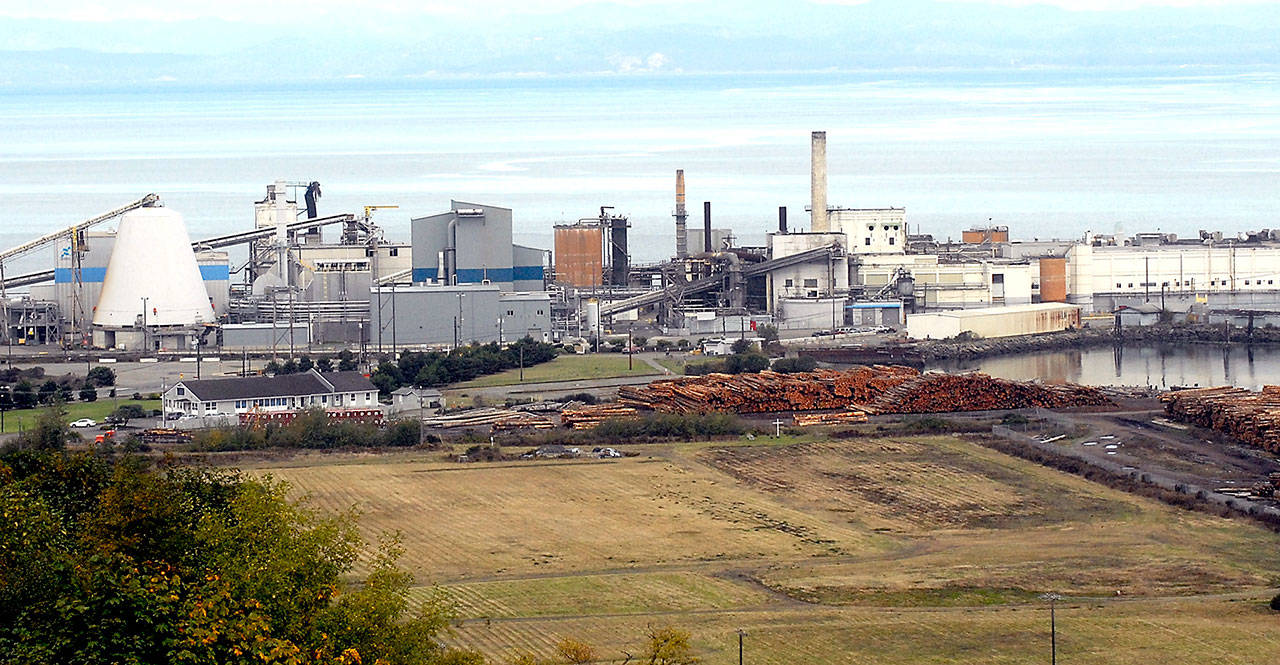PORT ANGELES — McKinley Paper Co. officials have said the company will begin production at its Port Angeles mill by September 2019, ending a curtailment that began in April 2017.
The company announced Sept 24 plans to produce 250,000 tons of containerboard at the mill on Ediz Hook, doubling its domestic capacity and bringing its total annual capacity to 2 million tons in Mexico and the U.S.
“We expect to start production by September 2019 and look forward to positively impact local and regional employment and the overall economy,” the announcement said.
McKinley purchased the Port Angeles mill from Japanese-owned Nippon Paper Industries USA for $20.6 million in March 2017.
The Mexican-owned company is retooling the 98-year-old factory to manufacture containerboard from recycled cardboard, a heavier grade paper than the newsprint and telephone directory paper that Nippon produced.
“Once we start up and are running at fully bore, we expect to have a total of about 150 employees,” said Cathy Price, McKinley human resources manger and spokeswoman.
Nippon also employed about 150 workers at the mill before it closed.
There are about 25 McKinley employees who are now maintaining the Port Angeles plant, Price said Tuesday.
Company officials announced the recycling-based “conversion plan startup” late Monday.
“McKinley will replicate its sustainability model to produce paper without cutting trees in the middle of the forest heart of USA: The state of Washington, contributing to further enhancing the environmental status in the region,” the announcement said.
“By recycling paper, the company aims to reduce energy and water consumption and landfill disposal in the region as well as to become a net capturer of CO2, helping to build a green economy.”
Plans to reopen the shuttered mill in December 2018 were shelved last February. Officials at the time cited market conditions for delaying the startup until an unspecified date in 2019.
McKinley has ordered “state-of-the-art” machinery and equipment for a startup by next September, company officials said.
“Maritime infrastructure will be enhanced to improve input and output freight options and minimize costs,” the announcement said.
“Additionally, the cogeneration system will be upgraded to efficiently produce green energy.”
The Nippon cogeneration plant produced steam and electricity for the mill and electricity for sale to green energy buyers.
The $85 million biomass facility opened in 2013.
A McKinley consultant is working with the Olympic Regional Clean Air Agency (ORCAA) on permits needed for the startup, ORCAA Executive Director Fran McNair said.
No applications for air quality permits had been filed as of Tuesday, McNair said.
“I’m sure they want to keep their permit active, but there’s going to be some changes to what they’re doing,” McNair said in a telephone interview.
“We’re thrilled that they’re planning to reopen, and we clearly want to work with them, but we haven’t received anything from their consultant yet.”
McKinley officials said the company would “consider additional investments and strategic alliances in the Northwest USA to deploy a corrugated box system to integrate its paper production into more value-added paper products.”
The planned startup comes as welcome news to the city of Port Angeles, which received nearly $500,000 per year in electric utility taxes when the Nippon mill was in operation.
Last year, city staff identified one-time cuts to help offset a budgeted loss of $440,000 in utility tax revenue from the mill’s curtailment in 2018.
When Nippon was in operation, it consumed nearly half of the electricity used in the entire city, providing tax revenue for core services like public safety, parks and streets.
City Manager Nathan West described the conversion plan startup as a “big deal” for Port Angeles.
“I’m extremely appreciative to McKinley for making this investment in our community,” West said in a Tuesday interview.
West added that he was “really excited” that McKinley is purchasing new equipment and streamlining the mill to allow it to operate more efficiently.
While the plant was being retooled, McKinley amended a longstanding lease with the city of Port Angeles to allow the Olympic Peninsula Rowing Association to move its boathouse on Ediz Hook to the city’s Sail and Paddle Park in the shadow of the mill.
The parcel, which has not been used for mill operations, provides beach access to Port Angeles Harbor and space for the rowing club to expand.
“We’re just really appreciative, and we’re looking forward to McKinley coming online in 2019,” West said.
McKinley is the U.S. subsidiary of Mexican paper maker Bio PAPPEL, which operates 30 production facilities and 13 recycled fibers collections centers in the U.S., Mexico and Columbia.
Senior staff writer Paul Gottlieb contributed to this report.


